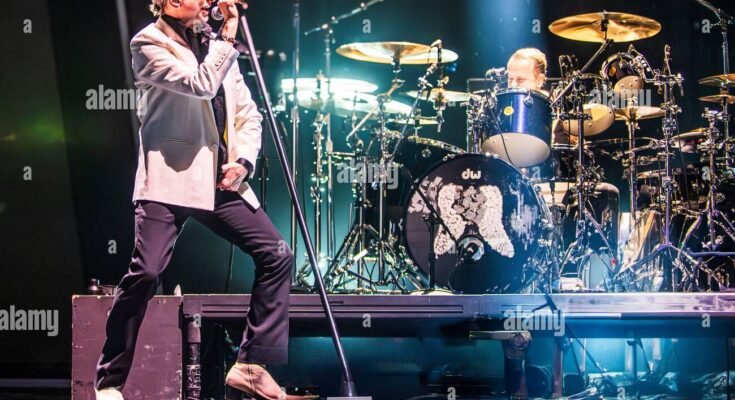In the rich tapestry of modern music history, few bands have maintained both relevance and reverence across decades the way Depeche Mode has. With the release of Depeche Mode: M, a stunning new documentary film and concert experience, the iconic synth-pop pioneers once again assert their enduring legacy. The film provides an immersive, emotional, and visually arresting chronicle of the band’s Memento Mori world tour—a sweeping musical pilgrimage that spanned 112 concerts across Europe and North America and captivated over three million fans.
A Tour Shaped by Loss, Rebirth, and Legacy
The Memento Mori tour wasn’t just another entry in the band’s long list of global performances—it was a deeply personal and transformative experience. Coming in the wake of founding member Andy Fletcher’s death in 2022, the tour—and the album it supported—carried an emotional gravity that infused each performance with a sense of reflection and tribute.
The Memento Mori album, released in March 2023, was shaped by themes of mortality, memory, and resilience. While death and impermanence were its central motifs, the music was never defeatist. Instead, it embraced the beauty and fragility of life—a message that resonated powerfully with audiences around the world. For lead vocalist Dave Gahan and multi-instrumentalist Martin Gore, the tour became a cathartic celebration of both their personal journey and the legacy of their departed bandmate.
The Cinematic Experience of Depeche Mode: M
Directed with a meditative yet electrifying touch, Depeche Mode: M is not merely a concert film. It’s a multifaceted narrative experience that weaves together visceral live footage with archival clips and behind-the-scenes moments, giving viewers an intimate look into both the spectacle of the tour and the humanity of the band behind it.
The film transitions fluidly between past and present. Vintage footage from the band’s formative years—grainy clips of early 80s performances, candid interviews, and shots of a youthful Fletcher—are juxtaposed with the grand, modern-day visuals of sold-out stadiums and anthemic choruses echoing across continents. This blending of timelines evokes a haunting yet uplifting nostalgia, reinforcing the central themes of memory and perseverance.
Gorgeously shot concert sequences capture Depeche Mode’s signature aesthetic: a moody, synth-driven sonic landscape paired with bold, minimalist visuals. With Anton Corbijn’s artistic direction—long associated with the band’s distinct visual identity—the concert stage becomes a canvas of shadows, strobes, and stark contrasts. Every track performed—whether it’s the haunting “Ghosts Again” or the immortal “Enjoy the Silence”—is rendered with cinematic grandeur, yet grounded in raw emotional resonance.
A Testament to Connection and Endurance
What makes Depeche Mode: M more than just a document of a tour is its ability to convey the profound bond between the band and its fans. Throughout the film, sweeping shots of devoted concertgoers—some of whom have followed the band for decades—emphasize the communal nature of the Depeche Mode experience. These aren’t just fans; they are witnesses to a multi-generational musical journey.
Moments of interaction between Gahan, Gore, and their audience punctuate the film, revealing the reciprocal energy that powers each performance. Gahan, ever the charismatic frontman, commands the stage with a mixture of spiritual intensity and rock-star bravado. Gore, in contrast, remains the grounding presence—stoic, focused, and introspective. Together, they create a dynamic that is both electrifying and intimate.
The inclusion of backstage vignettes, rehearsal footage, and reflective commentary from the band adds further depth. We see Gahan and Gore grappling with grief, contemplating their legacy, and re-evaluating their artistic purpose in the wake of Fletcher’s passing. Rather than retreat into nostalgia, M captures a band reinvigorated by adversity—finding new meaning in familiar songs, and continuing to evolve while staying true to their origins.
The Monumental Scale of Memento Mori
The sheer scale of the Memento Mori tour is a testament to Depeche Mode’s global impact. Selling out arenas and stadiums from Berlin to Buenos Aires, New York to Paris, the tour defied expectations not just in attendance but in emotional depth. For a band entering its fifth decade, the ability to attract millions while delivering performances of such passion and power is extraordinary.
Each of the 112 shows was a chapter in a larger narrative, and Depeche Mode: M captures that scope without sacrificing intimacy. The film hops between cities and cultures, showing how the band’s music transcends language and borders. Fans sing along in perfect unison, whether in Warsaw or Los Angeles, united by the universal messages in the band’s lyrics.
A Farewell or a New Beginning?
Perhaps the most poignant question surrounding M is whether it marks the final chapter in Depeche Mode’s storied career—or the beginning of a new era. The film never answers this directly. Instead, it leaves viewers with a sense of open-ended possibility. There is closure, yes, especially in the emotional tributes to Fletcher, but there is also a quiet defiance—a refusal to be boxed in by the past.
As Gahan declares during one of the film’s reflective voiceovers, “We’re still here. The music still matters. And as long as it does, we’ll keep playing.”
Final Thoughts
Depeche Mode: M is more than a tour documentary; it is a celebration of legacy, loss, and the unbreakable connection between artist and audience. Through its powerful blending of live performance and archival material, it offers a visceral journey through the emotional and physical landscapes of one of the most important tours in recent music history.
For longtime fans, it’s a love letter. For newcomers, it’s a gateway into the profound world of Depeche Mode. And for everyone, it’s a reminder of the enduring power of music to transcend time, tragedy, and silence.
In M, Depeche Mode doesn’t just remember—they revive.



